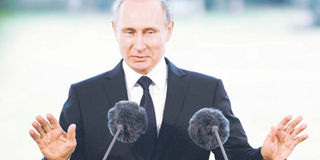ANALYSIS:Russian influence is perceived as growing around the world, despite global mistrust of Putin

A new survey of 25 countries has found largely negative views of Russia and its leader, President Vladimir Putin, all around the world.
At the same time, however, Russia’s influence on the world stage is seen as growing, according to the survey data released by Pew Research Center on Thursday.
The results suggest that though Russia is facing a myriad problems - including US sanctions, geopolitical isolation and a ruthless reputation - Putin has found ways to project Moscow’s power globally.
In key regions like the Middle East, Moscow appears to be enjoying the kind of influence that it has not seen since the days of the Soviet Union - often challenging American interests in the process.
But while the United States and Russia are often rivals for power and influence on the global stage, in many nations Putin and President Donald Trump are viewed in a similar manner: Pew’s data showed there was considerable overlap in negative views of the two leaders.
This correlation was not seen between Trump and French President Emmanuel Macron or German Chancellor Angela Merkel, and less pronounced with Chinese President Xi Jinping. In some countries, the overlap between negative views of Putin and Trump was huge: 83 per cent in Spain had negative views of both; 77 per cent in France.
In contrast there was comparatively little overlap in positive views of Putin and Trump in most countries. The Philippines was the only nation where a majority, 54 per cent, said they had confidence in both leaders to do the right thing in global affairs.
Putin, who has been accused of personal involvement in major international moves - like the attempt to influence the 2016 U.S. election or the attempted assassination of a former Russian spy in Britain - is viewed very negatively in a large number of the countries surveyed by Pew. Across the 25 countries polled, a median of 26 per cent had confidence in Putin to do the right thing in global affairs; 63 per cent had no confidence.
Such views were considerably lower than for other world leaders, like Merkel or Macron, though they were more positive than Trump’s. There were only two countries where a majority viewed Putin positively: the Philippines (61 percent) and Tunisia (53 percent).
Views of Russia as a whole were slightly more positive, with a median of 34 per cent of the countries polled expressing favorable views of Russia while 54 percent expressed unfavorable views. The Philippines (63 per cent), Tunisia (55 per cent), South Korea (53 per cent) and Greece (52 per cent) were the only four countries where a majority held positive views of Russia. In most countries, positive views of both Putin and Russia have fallen considerably in recent years.
In Sweden, unfavorable views of Russia grew from 59 per cent in 2007 to 79 per cent in 2018 - the highest unfavorable rating found in all countries, tied with the Netherlands.
Confidence in Putin, already low, has also dipped in most countries surveyed. However, it has increased in some countries, most notably the Philippines, where confidence grew from 38 percent in 2014 to 61 percent in 2018.
But if negative views of Russia are growing, so are assessments of its influence. Pew found that a median of 42 per cent thought that Moscow’s role in the world was more important than it was 10 years ago, compared to 19 per cent who thought it was less important and 28 per cent who thought it was the same.
There did not appear to be a direct link between appraisals of Russian influence and approval of the country. Only 23 per cent of the Philippines thought Russia’s role in the world was more important, compared to 22 per cent who said it was less important. But in Greece and Tunisia, majorities thought the country was more important (65 per cent and 59 per cent respectively).
Comparatively, a median of 31 per cent thought the United States played a more important role in the world today than 10 years ago - while 70 per cent of thought that China was more important.
Russia does not have the superpower status that the United States or even China does.
Despite its vast land mass and large population, it has a gross domestic product of $1.5 trillion - putting it closer in economic scale to South Korea or Canada.
But Russia has leveraged both high-cost foreign policy moves like the military intervention in Syria and relatively low-cost acts, like the numerous acts of misinformation it has been accused of, to cast a larger shadow over global affairs.
Kremlin image-makers have also played up Putin’s personal image to impress foreign audiences.
“We intensified Putin’s mystery on purpose,” Putin’s former political strategist Gleb Pavlovsky told The Washington Post. “You need to create an image of power” in a weak state.
Within Russia, Putin remains a remarkably popular figure. Although his domestic approval ratings have dipped recently, at 66 percent they still remain the envy of most Western politicians. Notably, most of Putin’s problems appear to be domestic in focus, while foreign policy can be tied to boosts in his popularity. According to Pew, 72 percent of the country believe the country is more important on the world stage than a decade ago.
The Pew Research Center survey was conducted from May to August among national random samples of 915 to 2,521 interviews in each of the 25 countries. The margin of sampling error for each country ranges from plus or minus 2.8 to 5.1 percentage points.(The Washington Post)




